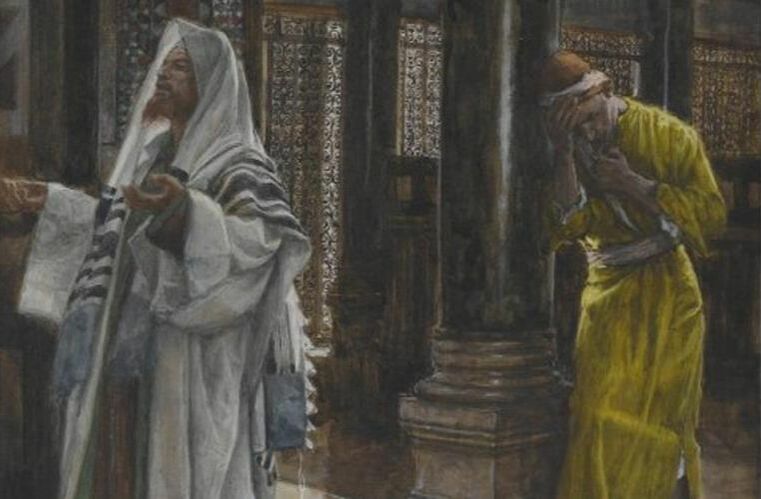|
Luke 18:9-14 (NRSVCE) He also told this parable to some who trusted in themselves that they were righteous and regarded others with contempt: “Two men went up to the temple to pray, one a Pharisee and the other a tax collector. The Pharisee, standing by himself, was praying thus, ‘God, I thank you that I am not like other people: thieves, rogues, adulterers, or even like this tax collector. I fast twice a week; I give a tenth of all my income.’ But the tax collector, standing far off, would not even look up to heaven, but was beating his breast and saying, ‘God, be merciful to me, a sinner!’ I tell you, this man went down to his home justified rather than the other; for all who exalt themselves will be humbled, but all who humble themselves will be exalted.” Be like the tax collector. Don’t be like the Pharisee.
Surely that’s the message of this parable, no? That is at least what it appears to be, at a cursory glance. The Pharisee, the one who has a higher status by Temple law and thus thinks himself righteous, thanks God he is not like the wicked people outside the Temple. But the tax collector is one of those people, and Jesus clearly says that it is the tax collector, not the Pharisee, who is justified. So if that’s the case, we ought to want to be like the tax collector, so that we too are justified, and not like the Pharisee, who is not. The trouble with this is that the Pharisee’s prayer isn’t wrong, factually speaking. He thanks God that he is doing pious things, rather than engaging in wicked deeds. And he ought to thank God for that, as ought we all. He has set himself apart from others, which is what the word “holy” means, according to the Law that was given by God. And that’s a good and righteous thing to thank God for. By the standards of the Temple law, he is righteous. What’s wrong is not that he thanks God for being set apart, but that he ascribes his righteousness to himself. “I fast twice a week; I give a tenth of all my income.” He accomplished this. He may be addressing the Lord, but his focus is on himself. The problem is that his motivations make his prayer self-congratulatory. By his actions, he is not like those other people. He has set himself apart from the others, he has clearly demarcated the line between “us” and “them,” and he thanks God he is on the right side of that line. And thus you can see the issue with reading this parable as simply “Don’t be like the Pharisee” or merely “be humble.” We end up leaving this parable attempting to be just as self-congratulatory as the Pharisee is. “God, I thank you that I am not like the other people: self-righteous Pharisees and hypocrites.” Just as he did, we place divisions amongst ourselves, we label people as “us” and “them,” and we thank God we are not like “them.” The tax collector, on the other hand, came to God not to extoll the merits of his own accomplishments. He came asking for mercy, knowing that nothing he did or could do was worthy enough. His only hope was in mercy. He never asked to be like the righteous people, like the Pharisee who was in the Temple. He was too desperate for that. He needed God’s mercy before anything else. He couldn’t be bothered to divide humanity up like the Pharisee did. God’s people are to be holy, yes. They are to be set apart, yes. But it is not by any individual’s, or even any collective people’s actions that this is accomplished. It is God, first and foremost, who sets His people apart and makes them holy. That’s what the tax collector realized, and why he begs for mercy. But we are not to come away with this siding with the tax collector, or else we fall into the same trap of placing the divisions ourselves—of siding against the Pharisee. The message of the parable, at least as I read it, is not merely “Be humble” or “Don’t be like the Pharisee.” But rather it is that when we are the ones who try to mark that line between “us” and “them,” we find that God is never on our side of the line. |
ArchivesCategories
All
|

 RSS Feed
RSS Feed